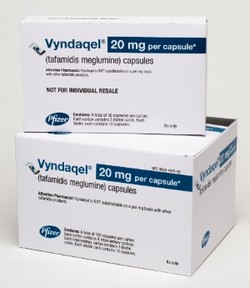Pfizer’s Vyndaqel and Vyndamax -- containing tafamidis to treat cardiomyopathy caused by transthyretin amyloidosis (ATTR-CM) -- do not deserve a rare disease pricing which is too high to help patients, a research team claimed.

On Wednesday, JAMA Cardiology published a research letter, “Initial Experience Prescribing Commercial Tafamidis, the Most Expensive Cardiac Medication in History.”
In the letter, the research team at the Oregon Health & Science University and the University of Pittsburgh said tafamidis, authorized for the treatment of ATTR-CM in May in the U.S., proved to reduce the risk of all-cause death and cardiovascular hospitalization.
However, the latest study showed that the medication’s high price surpassed the threshold of its cost-effectiveness, the researchers said.
In other words, the drug itself was effective in reducing the risk of death and cardiovascular hospitalization in patients with ATTR-CM but too expensive to benefit patients in real settings, according to the team.
The research team analyzed 50 patients who received Vyndaqel and Vyndamax prescriptions at the Oregon Health & Science University and found that most of the patients needed financial help for their treatment.
Out of 50, seven patients could not get Vyndaqel, three of them could not afford the out-of-pocket cost, two declined assistance, and one died before getting the drug.
Of the 43 who obtained Vyndaqel, 28 got the medication for free through support from either a foundation or Pfizer. Before financial assistance, the median 30-day out-of-pocket cost of Vyndaqel was $1,909.
“Many seniors have other preexisting competing financial commitments that prohibit them from being able to afford the costly copayments,” the researchers said in the study.
The “donut hole” gap (non-reimbursement of a prescription drug) is a particular problem for seniors on pricey medicines for chronic conditions.
ATTR-CM is a disease in which left ventricular function is incapacitated by amyloid protein deposits on the left ventricular wall, making the heart wall stiff and ultimately causing heart failure. If not genetic, ATTP-DM primarily affects people 65 years of age and above, and men.
However, seniors aged 65 or more will find it almost impossible to pay over $2,000 to treat ATTR-CM, a chronic disease, the research team said.
Moreover, as Vyndaqel and Vyndamax are not orphan drugs for ATTR-CM treatment, Pfizer should cut their prices, the team added.
Pfizer CEO Albert Bourla told investors on a conference call in late April that before Vyndaqel was launched, only about 1,000 to 2,000 ATTR-CM patients were diagnosed correctly.
However, with Pfizer’s disease awareness push and better adoption of specific cardiac imaging technology, the diagnosis rate went up to 13 percent, he said.
The U.S.
approved Vyndaqel for the treatment of hereditary transthyretin amyloid polyneuropathy (hATTR-PN).
In Korea, it obtained the status of an orphan drug and received the national health insurance coverage for once-daily dosing of Vyndaqel 20mg. The reimbursement for the drug is set at 141,900 won ($117) per one capsule of 20mg.
Pfizer has sought local approval for Vyndaqel and Vyndamax as ATTR-CM treatment, and the Ministry of Food and Drug Safety is reviewing the medication.
The U.S. researchers’ skeptical view on the designation of Vyndaqel and Vyndamax as rare disease treatments is drawing attention on how it could affect the drug licensing in Korea.

